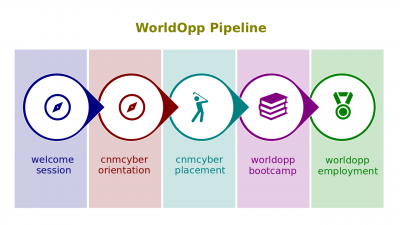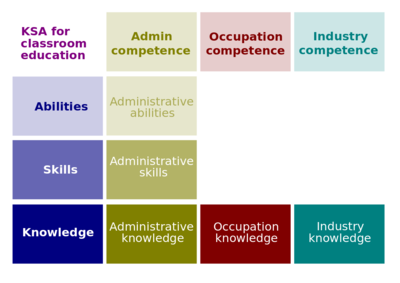Academic Credentials
Academic Credentials (hereinafter, the Lectio) is the second lesson part of the Training as a Service lesson that introduces its participants to educational credentials and related topics.
This lesson belongs to the Introduction to Education session of the CNM Cyber Orientation. The Orientation is the second stage of the WorldOpp Pipeline.
Contents
Content
The predecessor lectio is Educational Credentials.
Key terms
- Academic credential. An educational credential that is issued by an educational institution or credentialing organization to certify specific academic achievements traditionally related to someone's knowledge.
- High school diploma. An academic credential that certifies that someone has been graduated from a high school.
- GED (General Equivalency Diploma). A credential that certifies that someone has successfully passed the test that covers United States or Canadian high school-level academic skills.
- Diploma. A certificate or deed issued by an educational institution, such as college or university, that testifies that the recipient has completed a particular course of study.
- Associate degree (or associate's degree). An undergraduate academic degree awarded by colleges and universities upon completion of a course of study intended to usually last two years or more.
- Bachelor's degree. An undergraduate academic degree awarded by colleges and universities upon completion of a course of study lasting three to seven years depending on institution and academic discipline.
- Master's degree. A graduate academic degree awarded by colleges and universities upon completion of a course of study lasting one to three years beyond the coursework required by a Bachelor's degree.
- PhD (Doctor of Philosophy, also known as PhD degree or Ph.D.). The highest, terminal academic degree awarded by universities in most countries. The requirements to earn a PhD regularly include comprehensive examinations and work on thesis or dissertation based on extensive research.
- Professional degree. A degree that prepares someone to work in a particular profession, often meeting the academic requirements for licensure or accreditation.
- Credentialism (academic inflation). The process of the devaluation of educational qualifications because of the needs of educational institutions to increase revenues and cut expenses, on one side, and increasing demands, on the other side. This process further provokes credential creep.
Script
- An academic credential is an educational credential that is issued by an educational institution or credentialing organization to certify specific academic achievements traditionally related to someone's knowledge.
- For instance, diplomas commonly testify that the recipient has achieved specified objectives of a particular course of study. In the United States, there are two ways to get diplomas for high school-level academic skills. First, students can get graduated from a high school and receive a high school diploma. Second, they can pass the special test and receive GED (General Equivalency Diploma).
- Tertiary schools such as colleges and universities issue undergraduate and graduate degrees.
- Undergraduate credentials include associate degrees, which course of study intends to last about two years, and Bachelor's degrees, which courses of study may last from three and up to seven years depending on institution and academic discipline. Undergraduate programs are overwhelmingly built on learning content delivery.
- Graduate credentials include Master's degrees and PhD (Doctor of Philosophy) or similar highest, terminal degrees. Graduate programs are designed to last from one to four years beyond the coursework required by a Bachelor's degree. Both types of these credentials require independent research. The requirements to earn a PhD regularly include comprehensive examinations and work on thesis or dissertation based on extensive research.
- Some educational institutions award professional degrees that usually meet both academic requirements for licensure or accreditation and professional experience in the credentialed profession.
- There are two more opposite trends that are worthy to be mentioned.
- On one hand, credentialism or academic inflation refers to the tendency of the devaluation of educational qualifications because of the needs of educational institutions to increase revenues and cut expenses, on one side, and increasing demands, on the other side. This process further provokes credential creep.
- On another hand, a few occupations don't require academic achievements. All in all, the probability that you will ever meet any recruiter who has earned the degree in Recruitment is obsolete.
Educational Institutions is the successor lectio.

